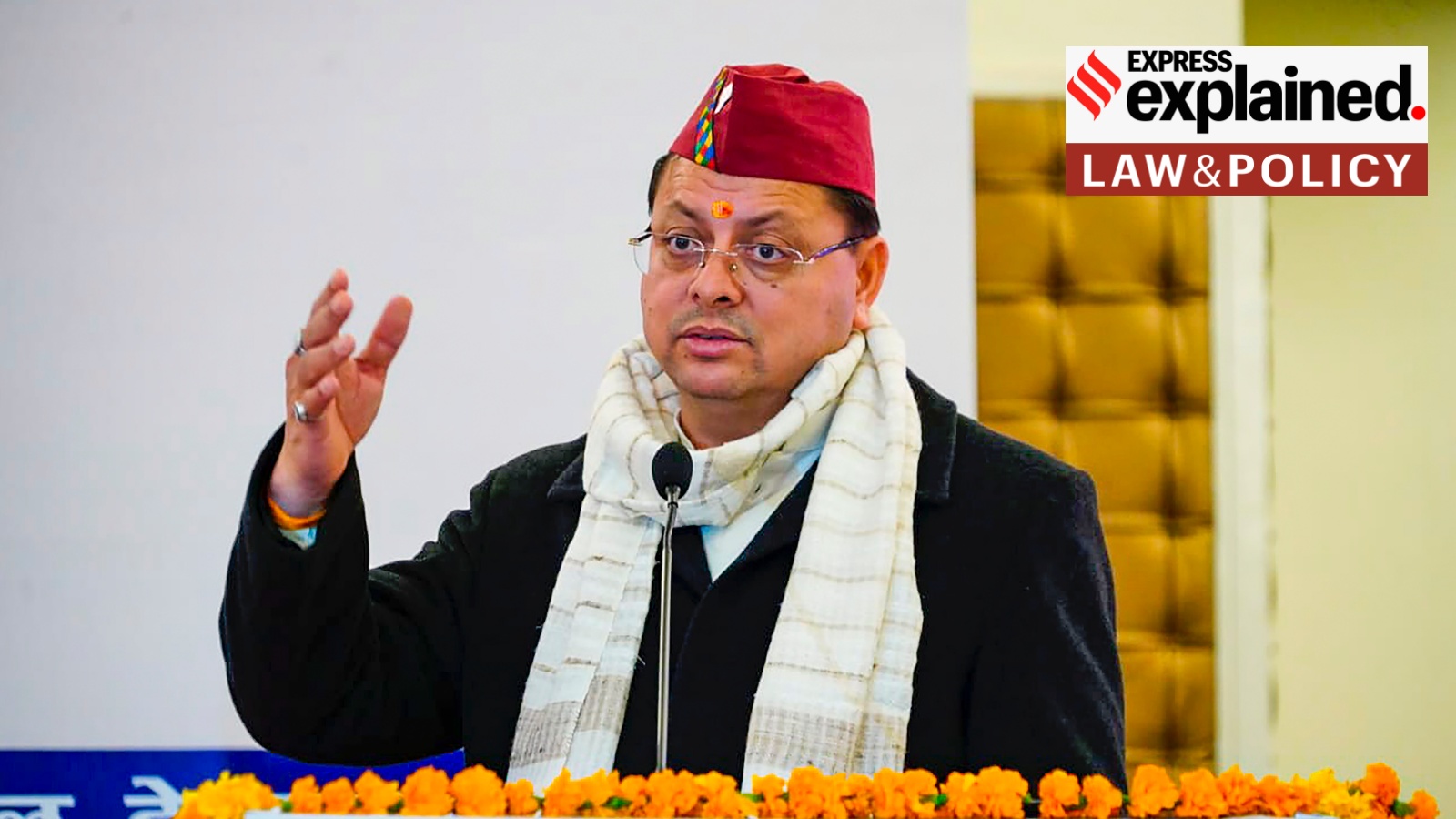Uttarakhand Uniform Civil Code to be passed in February: How did it come about and what can be expected?
On Republic Day, Chief Minister Pushkar Singh Dhami announced that the Uniform Civil Code Bill will be passed on February 5. Why was the committee on UCC constituted and what aspects of personal laws is it considering under its ambit?
 The introduction of the UCC was a key campaign promise made by the BJP. A committee on the matter was setup following the party's win in the 2022 state elections, after which Pushkar Singh Dhami became the CM. (PTI Photo)
The introduction of the UCC was a key campaign promise made by the BJP. A committee on the matter was setup following the party's win in the 2022 state elections, after which Pushkar Singh Dhami became the CM. (PTI Photo) On February 5, the Uttarakhand Assembly will convene to pass the Uniform Civil Code (UCC) Bill. After multiple extensions, the five-member committee led by former Supreme Court Justice Ranjana Prakash Desai is expected to hand over its report to the government a couple of days before the assembly convenes.
How did the UCC Bill come up at all? What changes is it expected to introduce? We explain.
The history of the UCC pitch in Uttarakhand
The introduction of the UCC was a key campaign promise made by the BJP in the lead-up to the 2014 general elections. The party promised to create a uniform set of personal laws, regardless of religion, to govern subjects like marriage, inheritance, divorce, and adoption. This promise stems from Article 44 of the Indian Constitution, which says: “The State shall endeavour to secure for the citizens a uniform civil code throughout the territory of India.”
It is part of the Directive Principles of State Policy (Part IV of the Constitution), whose provisions are not enforceable by any court, but the principles laid under them are to be considered as “fundamental in the governance of the country and it shall be the duty of the State to apply these principles in making laws.”
This poll promise was reiterated by the BJP before the 2022 state Legislative Assembly elections in Uttarakhand. On May 27, 2022, following the BJP’s electoral victory, the Uttarakhand government announced that a five-member committee led by former Supreme Court Judge Ranjana Prakash Desai would submit a report with a draft of the Bill.
The UCC was met with opposition from rival political parties. Congress representatives from the state, such as MLA Pritam Singh, accused the BJP of ignoring its development agenda and instead focusing on disturbing communal harmony and polarising society. All India Majlis-e-Ittehadul Muslimeen (AIMIM) leader Asaduddin Owaisi and AIMIM Member of Parliament Syed Imtiaz Jaleel have also made statements against the UCC.
The report was initially meant to be submitted in November 2022. However, the deadline was extended multiple times, despite the Chief Minister announcing in June 2023 that the committee had completed its work. Now, with the 2024 general elections approaching, the UCC is finally ready to be submitted.
Since the committee’s formation, it has received over 2.5 lakh suggestions from the public, most of which were received through letters, registered posts, emails, and written suggestions through its online portal. By September of last year, the committee had also held 38 public meetings across the state and received suggestions through public interactions.
 Join us for Explained Live event on India’s space ambition
Join us for Explained Live event on India’s space ambition
What changes may be brought in by the Uttarakhand UCC?
The Uttarakhand government and the committee have stated that gender equality was one of the key considerations when preparing the report. Along with uniform personal laws for all people residing in the state, the UCC will introduce provisions that treat men and women equally in issues relating to inheritance.
The UCC will also reportedly reject the practices of polygamy, iddat, and halal in response to strong demands from Muslim women in the state. However, the minimum age for marriage for both men and women will likely remain the same as it was previously (18 years for women and 21 years for men). The UCC will also regulate live-in relationships and require a mandatory declaration to start and terminate live-in relationships.
Other states expected to follow in Uttarakhand’s footsteps
Following the enactment of the UCC in Uttarakhand, similar bills are expected to be placed before the assemblies in Gujarat and Assam as well. The Gujarat government constituted a committee in 2022 to look into various aspects of the UCC. Assam Chief Minister Himanta Biswa Sarma, speaking at the Hindu Ekta Yatra in Karimnagar last year, also spoke strongly in favour of the UCC. Notably, Goa was the first state in the country to implement the UCC.
- 01
- 02
- 03
- 04
- 05






































